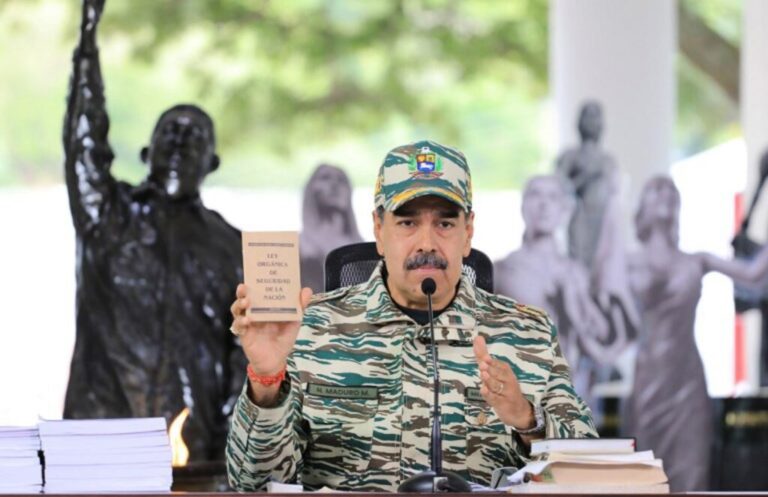Venezuelan President Says No Dispute With Washington ‘Justifies Military Conflict’ Amid Tensions…
Venezuelan President Nicolás Maduro has sought to ease concerns over mounting tensions with the United States, declaring in a televised address that “no dispute with Washington justifies military conflict,” even as relations between the two countries remain at one of their lowest points in recent years.
The remarks came during a nationally broadcast event late Friday, where Maduro addressed members of the armed forces and government officials in Caracas. His comments followed weeks of heightened rhetoric after U.S. officials warned Venezuela against what they described as “destabilizing actions” in the region. Washington has also expressed alarm over Caracas’ deepening ties with Russia, Iran, and China — a diplomatic alignment that U.S. lawmakers argue undermines security interests in the Western Hemisphere.
Maduro, however, framed his message as an appeal to avoid escalation and emphasized Venezuela’s desire for dialogue. “We have profound differences with the government of the United States, yes,” he acknowledged. “But there is no dispute, no matter how deep or serious, that can justify a war. Venezuela will never be the aggressor.”
A Delicate Moment in Bilateral Relations
U.S.–Venezuela relations have long been fraught, but recent months have seen fresh flashpoints. Washington has maintained wide-ranging sanctions against Caracas since 2019, when it stopped recognizing Maduro as the legitimate president following elections that the U.S. and its allies denounced as fraudulent. Instead, the U.S. recognized opposition leader Juan Guaidó, though international backing for Guaidó has since waned.
While the Biden administration has signaled limited openness to recalibrating its Venezuela policy, particularly in the wake of global oil supply disruptions, progress has been halting. A brief thaw in 2023, when U.S. officials authorized Chevron to expand operations in Venezuela in exchange for commitments to hold free and fair elections, stalled after opposition candidates were barred from running.
In recent weeks, the rhetoric has sharpened again. U.S. officials have accused Maduro of violating democratic norms, while Venezuelan state media has lambasted Washington for “imperialist aggression.” Against that backdrop, Maduro’s insistence on rejecting armed confrontation struck a somewhat conciliatory note.
Military Preparedness, but Calls for Peace
Despite his words of restraint, Maduro used the address to underscore the readiness of Venezuela’s military to defend national sovereignty if necessary. “Our Bolivarian National Armed Forces are stronger than ever,” he declared, flanked by senior generals. “But their mission is not war. Their mission is peace and stability.”
Analysts note the dual message: affirming Venezuela’s capacity to resist foreign pressure, while also signaling a willingness to avoid direct conflict with Washington. “Maduro is walking a tightrope,” said Carlos Romero, a Caracas-based political scientist. “He wants to project strength to domestic audiences and reassure allies like Russia and China, but he also understands the risks of open confrontation with the U.S.”
Regional Ramifications
The Venezuelan president’s comments also come as tensions ripple across Latin America. Neighboring Colombia has raised concerns about Venezuela’s military activities near the shared border, while Guyana continues to press its case at the International Court of Justice over the disputed Essequibo region. The U.S. has thrown its support behind Guyana, a move Caracas has condemned as interference.
Maduro insisted Friday that Venezuela seeks peace with its neighbors as well. “Our disputes must be resolved through diplomacy, through dialogue, through international law — not through threats or the use of force,” he said.
Regional organizations, including the Community of Latin American and Caribbean States (CELAC), have urged restraint from all sides. Brazil, under President Luiz Inácio Lula da Silva, has positioned itself as a potential mediator between Caracas and Washington, with Lula reiterating last month that “South America must not become a theater of great-power rivalry.”
Washington’s Response
The U.S. State Department has not yet formally responded to Maduro’s latest remarks, though officials in recent weeks have reiterated that the Biden administration is committed to pursuing diplomacy while also holding the Venezuelan government accountable for human rights abuses and electoral violations.
One senior U.S. official, speaking on condition of anonymity, told reporters that Washington “does not seek conflict with Venezuela” but will continue to “stand firmly for democratic principles and regional stability.”
A Fragile Path Ahead
Observers remain cautious about whether Maduro’s message will translate into concrete steps toward de-escalation. “Words matter, but they must be followed by action,” said Cynthia Arnson, a Latin America specialist with the Wilson Center in Washington. “If Maduro is serious about avoiding conflict, he needs to engage in meaningful dialogue not just with the U.S., but with Venezuela’s own opposition and civil society.”
For ordinary Venezuelans, weary from years of economic collapse, sanctions, and political turmoil, the prospect of further instability is deeply worrying. On the streets of Caracas, reactions to Maduro’s speech were mixed. Some welcomed his stance against war, while others dismissed it as political theater.
As the situation unfolds, one thing remains clear: while both Washington and Caracas profess not to want conflict, deep mistrust and unresolved disputes continue to cast a long shadow over the bilateral relationship. Whether Maduro’s call for peace will open the door to genuine engagement — or remain another fleeting moment of rhetoric — will depend on the choices made in the coming months.
Would you like me to make this read more like a breaking news report (fast-paced, urgent, headline-driven) or more like a feature analysis (deeper background, more context)?
